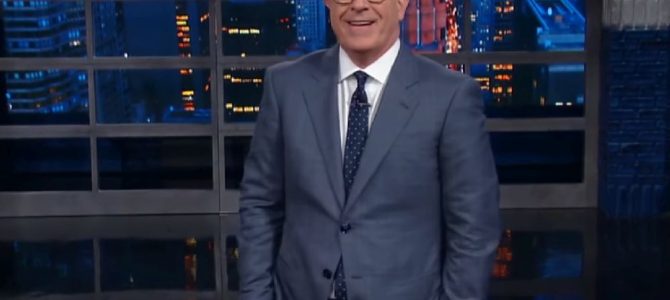
It’s the infuriating Trump-era story of the moment, somehow both shockingly absurd and completely predictable, and one a great many headline-writers got completely wrong.
A.V. Club’s “The FCC is Going After Stephen Colbert“ is a solid indicator of the kind of SEO-friendly screamer that led to outraged statements against this seemingly atypical incursion by the commission into free speech (perhaps even “political speech”) that must only be a result of President Donald Trump’s unique brand of tyrannical governance.
Star Trek actor and Internet meme aggregator George Takei took to Facebook to lament, “Censorship is a dangerous thing. Worrisome, indeed.” Former Clinton administration Labor Secretary Robert Reich posted to the social media site that he is concerned a chilling effect could overtake other comedians “who may now pull their punches” because “Trump is thin-skinned and vindictive” and “Trump’s FCC chairman seems eager to do Trump’s bidding.”
Even though FCC Chairman Ajit Pai conceded the indecency rules that could potentially land Colbert and CBS in hot water are relaxed at the time of night the “Late Show” airs, the truly sad reality is there is nothing atypical about this, which is as big a problem as Trump himself.
That a commission of up to five unelected bureaucrats (there are only three at the moment) have the authority to sanction a late-night comedian for making an unfunny joke containing a single bleeped-out vulgarity, and that reviewing every single complaint about supposedly indecent content is standard FCC operating procedure, is the disease. The fact that such awesome powers are now held by “Trump’s FCC” is merely the symptom.
The FCC Is Unpredictable, Subjective, and Petty
The FCC essentially hounded Howard Stern off terrestrial radio after a decade and a half of imposing fines on his employers totaling in the millions of dollars, although he was never accused of using any of the so-called “seven dirty words.” Each fine was the direct result of complaints by listeners, including several affiliated with right-wing religious groups. The investigations themselves led the FCC to broaden the parameters of what constitutes indecency. Essentially, the commission gave itself more authority over speech and has shown no indication of ever giving itself less authority.
Devotees of classic early-90s kitsch will remember the film “Pump Up the Volume,” where Christian Slater plays an anonymous pirate radio DJ who exposes corruption at his high school and enthralls his classmates with hilarious and vulgar diatribes about the hypocrisy of suburban existence. The FCC, unsurprisingly, is one of the film’s villains because instead of merely regulating the use of a scarce resource — the public airwaves — they also presumed to regulate the content of broadcast transmissions, often with little consistency in applying their ever-changing rules, as well as a tendency to play favorites. For example, nudity or profanity might be perfectly fine during regular broadcast hours if the content is deemed sufficiently “educational,” but if it’s for entertainment value, the exact same content could be deemed “indecent” and its broadcaster subject to punitive action.
The FCC’s website defines profanity as “‘grossly offensive’ language that is considered a public nuisance.” Its definition of obscenity is longer but no less subjective: “It must appeal to an average person’s prurient interest; depict or describe sexual conduct in a ‘patently offensive’ way; and, taken as a whole, lack serious literary, artistic, political or scientific value.”
Got that? If you don’t, no need to fret. The FCC’s site implores citizens “if you ‘know it when you see it’ and find it objectionable, you can tell the FCC and ask us to check into it,” which makes every American citizen into a potential prosecutor of free speech.
Swallow Your Charges of Hypocrisy, My Dear Left
Some on the Left have asked why there aren’t more vocal calls from right-leaning free speech advocates for the FCC to back off liberal hero Colbert, a fair point. Yet many of the same liberals who are shocked (shocked!) that the FCC might go after one of its own are the same people who applauded Colbert’s former “Daily Show” colleague John Oliver’s highly influential viral smash rant in favor of the FCC assuming the power to regulate the Internet “like a utility,” a.k.a. net neutrality.
The argument in favor of net neutrality is essentially that without extensive government control of the Internet, ISPs will create artificial scarcity by instituting a multi-tiered system of “speed zones” online. Even though the Internet has been a thing for some time now and such a feared circumstance has yet to materialize, pro-net neutrality advocates were unmoved. Something must be done to prevent “cable company f-ckery!” as Oliver so eloquently put it, although those very same cable companies love the idea of the government stifling competition to their fiefdoms.
Yet the Colbert kerfuffle demonstrates why putting the FCC in charge of the Internet is a risky bet for anyone still interested in robust free speech protections.
During the last presidential campaign, both Trump and Hillary Clinton waved away concerns about free speech to advocate for increased government censorship on the Internet based on national security concerns, specifically ISIS recruitment. Other lawmakers have echoed such calls, but the previous FCC chairman, Tom Wheeler, told Congress that the commission lacked the authority to censor individual websites.
That’s a relief, but only a temporary one, because if the history of the FCC has shown us anything, it’s that it will always seek to increase the scope of its own authority, change the rules on what is protected speech at the whims of just a few unaccountable commissioners, and take seriously the complaints of both political groups and individual cranks who don’t grasp the concept of changing the channel if you’re not into the content.
It’s reasonable to be concerned with potential “cable company f-ckery” over inhibiting the flow of information on the Internet, but federal government f-ckery with free speech — especially over a tin-eared joke at the expense of the president — should be of at least as much concern.









